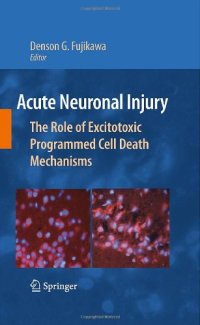
Ebook: Acute Neuronal Injury: The Role of Excitotoxic Programmed Cell Death Mechanisms
- Tags: Neurosciences, Neurology, Pathology, Cell Biology, Neurobiology, Psychiatry
- Year: 2010
- Publisher: Springer US
- Edition: 1
- Language: English
- pdf
This book is the result of a convergence of scientific information regarding mechanisms that produce acute nerve cell death in the brain. Although seemingly disparate, stroke, brain and spinal cord trauma, coma from a low serum glucose concentration (hypoglycemia), and prolonged epileptic seizures have in common the inciting factor of excitotoxicity, the activation of a specific subtype of glutamate receptor by an elevated extracellular glutamate concentration that results in an excessive influx of calcium into nerve cells. The high calcium concentration in nerve cells activates several enzymes that are responsible for degradation of cytoplasmic proteins and cleavage of nuclear DNA, resulting in nerve cell death. The high calcium concentration also interferes with mitochondrial respiration, with the resultant production of free radicals that damage cellular membranes and nuclear DNA. Understanding the biochemical pathways that produce nerve cell death is the first step toward devising an effective neuroprotective strategy, the ultimate goal.
Acute Neuronal Injury will be useful to neuroscientists and general cell biologists interested in cell death. The book will also be helpful to clinically oriented neuroscientists, including neurologists, neurosurgeons and psychiatrists.
About the Editor:
Dr. Denson Fujikawa is an Adjunct Professor of Neurology at the David Geffen School of Medicine at UCLA, a member of the Brain Research Institute at UCLA and a Staff Neurologist at the Department of Veterans Affairs Greater Los Angeles Healthcare System. His interest in mechanisms of nerve cell death in the brain began during a two-year epilepsy research fellowship with Dr. Claude Wasterlain, from 1981 to 1983. He is a Fellow of the American Academy of Neurology and is a member of the American Epilepsy Society, American Neurological Association, International Society for Cerebral Blood Flow and Metabolism, and the Society for Neuroscience.
The purpose of this book is to present clinically relevant basic mechanisms of excitotoxic neuronal death, which in the adult mammalian brain is morphologically necrotic, not apoptotic, and which involve caspase-independent mechanisms of programmed cell death.
The spectrum of clinically relevant pathologically induced excitotoxic neuronal death includes cerebral ischemia, traumatic brain injury, cerebral hypoglycemia, and status epilepticus. By investigating mechanisms, potential neuroprotective strategies can be identified that may have future clinical application.